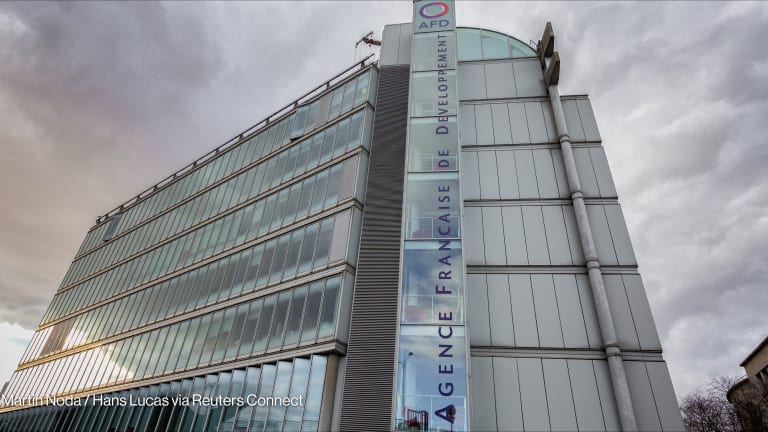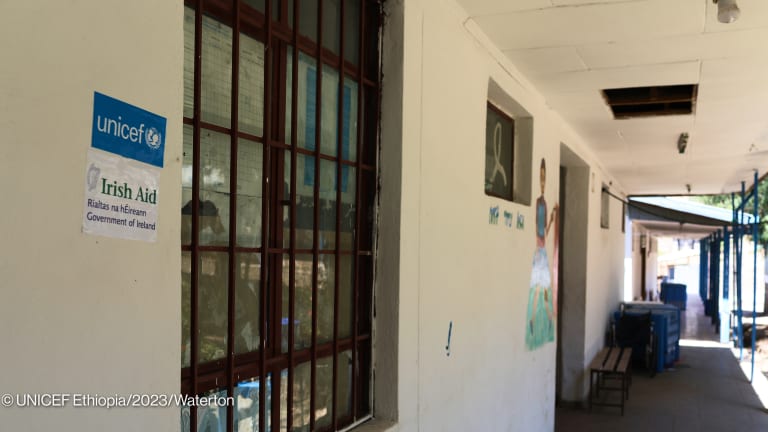French aid: A primer
In the wake of the country's election, it seems likely that French aid will continue to increase in the coming years. Here's an outline of how aid works in the country right now.
On Sunday, incumbent Emmanuel Macron won against challenger Marine Le Pen in France’s presidential election. The news is good for French aid, which has been steadily increasing under Macron. Last year, the French Parliament passed a bill — the Program and Orientation Bill on Solidarity-Based Development and the Fight Against Global Inequalities — that set a target of allocating 0.7% of the country’s gross national income to official development assistance by 2025. With Macron’s victory, this trend is likely to continue. Preliminary figures published earlier this month by the Organisation for Economic Co-operation and Development suggest that France’s ODA in 2021 accounted for 0.52% of its GNI. The data in this article is drawn from a number of sources, including OECD’s Co-operation Profiles, Donor Tracker, and French agencies. In all cases, Devex used the most recent figures available, meaning that some numbers cover 2021 while others are from 2019 to 2020. Increased aid in recent years France’s ODA-to-GNI ratio has increased in recent years, after a period of stagnation. The ratio rose from 0.37% in 2014 to 0.43% in 2017, according to OECD figures. In 2018, OECD changed to a new methodology for counting ODA, meaning that newer figures are not directly comparable with the years before. However, the French aid ratio continued to improve under this “grant equivalent system,” which “measures ODA loans more accurately and credibly.” From 2018 to 2020, the country’s ODA-to-GNI ratio rose from 0.43% to 0.53%. In 2021, France ranked fifth among Development Assistance Committee member countries in terms of money spent on aid, with an annual budget of $15.4 billion. This was up $1.3 billion in real terms from the previous year and accounted for 8.6% of the total ODA from DAC member countries. The increase in recent years has been driven largely by the country’s contribution to the COVID-19 response. In 2021, France allocated $1 billion for activities related to the pandemic — $508 million less than the previous year in real terms. It also donated excess COVID-19 vaccines, worth $318 million, to lower-income countries last year. French aid is projected to reach $16.4 billion in 2022 — of which $11.6 billion comes from the general budget and the remaining $4.8 billion from sources such as debt relief mechanisms, funding from the Solidarity Fund, and contributions to the European Commission and multilateral organizations. Most aid disbursed bilaterally France channels the majority of its aid bilaterally. From 2009 to 2019, its annual bilateral disbursement consistently amounted to over $7 billion, based on 2018 prices. The highest level was in 2019, at $9.7 billion, while the lowest was in 2015, at $7.2 billion. Core contributions to multilateral institutions ranged from $3.9 billion to $5.8 billion. France’s contribution to multilateral organizations went largely to European Union institutions, which accounted for 52.3% of France’s multilateral budget in 2019. Other recipients of significant funding included the United Nations and World Bank Group. Preliminary data for 2021 suggests an increase in multilateral contributions to $6.1 billion, while bilateral disbursement is shown as $8.2 billion. Multiple development agencies French aid follows a complex institutional setup, with the Interministerial Committee for International Cooperation and Development, or CICID, acting as the chief coordinating body. Meanwhile, the French Development Agency, or AFD; Ministry for Europe and Foreign Affairs, or MEAE; and Ministry of the Economy and Finance, or MINEFI, act as the main players among approximately 10 other entities. CICID, led by the prime minister, defines France’s long-term development priorities, while MEAE and MINEFI manage the country’s development policy. MEAE also coordinates the annual report on the implementation of planned increases in ODA. AFD, which acts as a public development agency and development bank, is the country’s implementing agency — delivering the biggest chunk of France’s ODA. In 2020, AFD’s total aid commitment for development projects amounted to over €12.1 billion. In 2019, AFD disbursed a total of $6.2 billion, or 42.8% of France’s total aid that year. Following this were MEAE with $2.1 billion, the Ministry of Higher Education, Research and Innovation with $1.2 billion, and MINEFI with $1.1 billion. The rest, worth $3.9 billion, was disbursed through other government agencies. France disbursed significant aid through the Ministry of Higher Education, Research and Innovation. This reflects the country’s focus on global education. Regional and sectoral priorities Africa and Asia were among the priority regions for bilateral ODA, receiving $4 billion and $1.6 billion respectively in 2019. Around $2.9 billion, or 30.5% of France’s total bilateral ODA, went to just 10 countries. Morocco got the biggest portion, at $444.7 million, followed by Côte d’Ivoire with $421.3 million and Cameroon with $419.4 million. Interestingly, only Senegal, which ranked fourth, was among the top recipients of bilateral ODA that is part of the 19 priority countries CICID identified in 2018. Based on OECD Statistics portal, France disbursed $868.4 million to the other 18 countries in 2019. A big chunk of France’s aid was allocated to cover the cost of hosting refugees within its borders. This amounted to $1.2 billion, or 12.5% of the total bilateral ODA in 2019. In 2021, France remained one of the biggest spenders on so-called in-donor refugees, at $1.2 billion — ranked fourth among DAC member countries despite a $73 million cut from 2020. French aid focuses on five development priorities, as laid out by CICID in 2018: health, climate, education, gender equality, and stability. Climate change has been one of France’s long-term priorities. The country committed to increase its spending on climate projects by $2.2 billion annually from 2015 to 2020. In 2019, AFD achieved its goal of allocating 50% of its financing to climate-related projects, with $6.8 billion in total disbursement. France’s fight against terrorism is done through development projects on peace and stability, with a focus on Africa’s Sahel region. In 2017, France launched the Sahel Alliance, which supports development and security in Burkina Faso, Chad, Mali, Mauritania, and Niger. A total of $10.1 billion from different donors was allocated for disbursement between 2018 to 2022. Education is among the primary focuses, with $1.7 billion allocated in 2019. In 2021, France pledged $401 million to the Global Partnership for Education for 2021 to 2025 to support education-related projects. Health is also a priority, with funding channeled mainly through multilateral organizations: $1.4 billion in 2019, including an additional $60 million to hit the $14 billion target replenishment, to the Global Fund to Fight AIDS, Tuberculosis and Malaria; $280 million commitment for 2021 to 2026 to Gavi, the Vaccine Alliance; and $11 million in 2019 to Unitaid for the Access to COVID-19 Tools Accelerator. Meanwhile, gender equality remains a cross-cutting priority — often integrated with other sectors. In 2019, France committed $4.3 billion, or 39.5% of its bilateral ODA, to gender equality. Update, June 22, 2022: This article has been updated to reflect links to OECD database. Try out Devex Pro Funding today with a free five-day trial, and explore funding opportunities from over 850 sources in addition to our analysis and news content.
On Sunday, incumbent Emmanuel Macron won against challenger Marine Le Pen in France’s presidential election. The news is good for French aid, which has been steadily increasing under Macron.
Last year, the French Parliament passed a bill — the Program and Orientation Bill on Solidarity-Based Development and the Fight Against Global Inequalities — that set a target of allocating 0.7% of the country’s gross national income to official development assistance by 2025. With Macron’s victory, this trend is likely to continue.
Preliminary figures published earlier this month by the Organisation for Economic Co-operation and Development suggest that France’s ODA in 2021 accounted for 0.52% of its GNI.
This story is forDevex Promembers
Unlock this story now with a 15-day free trial of Devex Pro.
With a Devex Pro subscription you'll get access to deeper analysis and exclusive insights from our reporters and analysts.
Start my free trialRequest a group subscription Printing articles to share with others is a breach of our terms and conditions and copyright policy. Please use the sharing options on the left side of the article. Devex Pro members may share up to 10 articles per month using the Pro share tool ( ).
Miguel Tamonan is a Senior Development Analyst at Devex, where he analyzes data from public and private donors to produce content and special reports for Pro and Pro Funding readers. He has a bachelor’s degree in Political Science with a Major in International Relations from the Polytechnic University of the Philippines.








